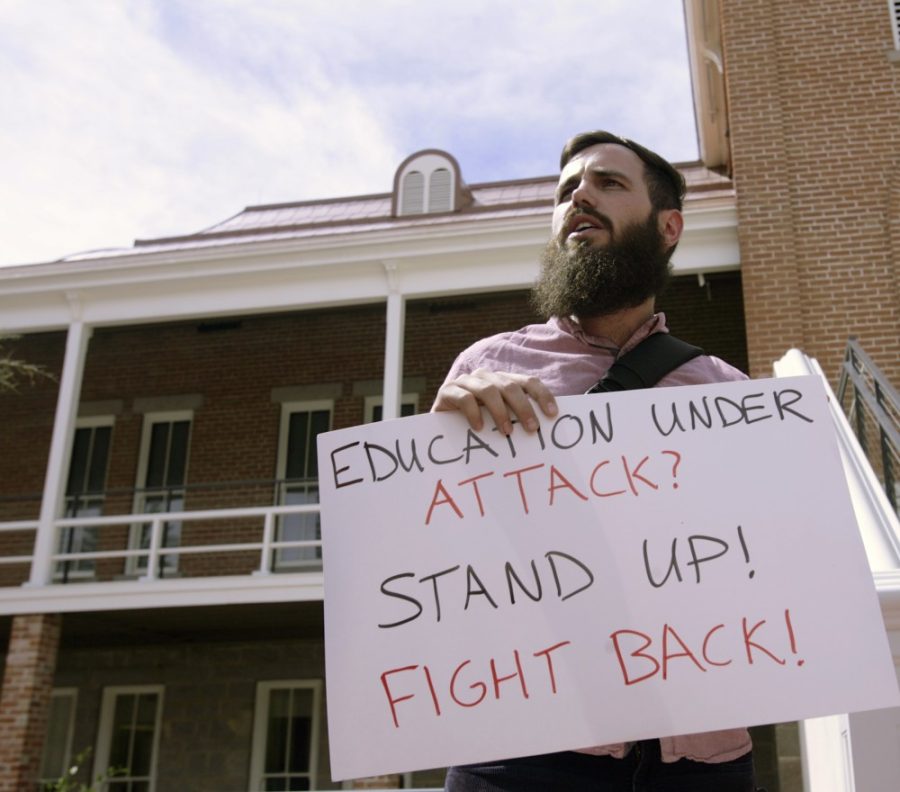Following two student-led protests that criticized UA President Ann Weaver Hart’s commitment to campus cultural centers and the student body as a whole, Hart announced a new diversity task force late Sunday night.
The task force, created to address campus climate diversity issues, came shortly after the newly-formed student movement known as the Marginalized Students of the University of Arizona released a nearly 20-page list of demands on March 8.
Kevyn Butler, Black Student Union co-president and leader of the MSUA protest held on March 8, previously said that cultural groups do not feel it is their job to come up with the specifics of implementing demands.
“Our jobs are to just let them know that needs aren’t being met and that they can do more,” Butler said. “The ways in which a lot of these demands need to be implemented are based upon the people who are being paid, who are supposed to be doing these jobs; so figuring out the structure of the implementations, where the money is supposed to come from, how it’s supposed to be implemented, who oversees it, those things, those aren’t really our jobs.”
The task force, which will include representatives from the faculty senate, diversity councils, diverse alumni associations and clubs, Disability Resource Center, religious groups, Associated Students of the University of Arizona, Graduate and Professional Student Council and student cultural groups, has one notable exception: It does not include the Graduate Student Organizing Committee, according to a press release.
The GSOC led the most recent protest on March 13 in a show of support for the Marginalized Students’ movement and in protest of Hart’s recent appointment to the DeVry Education Group’s Board of Directors.
Read: Students from GSOC protest Hart for DeVry Education Group appointment and campus minority groups.
Alexander Karaman, a founding member of GSOC and organizer of the March 13 protest, said the committee had not received an invitation to join the task force.
“We’ll actually fight for real change on this campus. They’re terrified of us,” Karaman said of the administration.
While he believes strongly in the groups involved with the MSUA, Karaman said he doubts the new task force will be effective.
Current ASUA Chief of Staff and 2016-2017 President-elect Mikey Finnegan, on the other hand, was of a more hopeful opinion.
“We’ve had diversity coalitions like this before, but hopefully this is a brand new caliber that can get things done on campus and help represent all students—marginalized students and everyone on campus,” Finnegan said.
He acknowledged that ASUA and UA cultural groups have grown distant in the past couple of years, saying it was perhaps the most distant he’d seen over his last three years with ASUA.
He shared that ASUA had reached out to the groups after the MSUA released their list of collective demands, but had not yet heard back from the groups.
Finnegan expressed excitement for where ASUA’s relationship with cultural groups may go in the future.
“I’m very excited and I hope they are as well to sit down with us and meet with us and create a dialogue that we can talk with administration because I can definitely tell you ASUA has a great relationship with administrators,” he said. “So hopefully we can use that to our advantage.”
Stefano Saltalamacchia, a junior studying gender and women’s studies and Italian and one of this semester’s ASUA excutive vice presdential candidates, was present at the MSUA protest and has been involved with several of the cultural centers on campus.
Saltalamacchia thinks that the diversity task force was created with good intent but also hopes that the force does not try to “reinvent the wheel,” stating that MSUA has given the administration clear direction with their list of demands.
“I think, at this point, what the task force should potentially be doing is getting together with the appropriate voices of students and the appropriate bodies of the administration so that we can see how feasible all of this is,” Saltalamacchia said. “Because I think that a lot of it is just going to be appropriating funds.”
Sam Gross contributed to the reporting of this article.
Follow Michelle Jaquette on Twitter.









